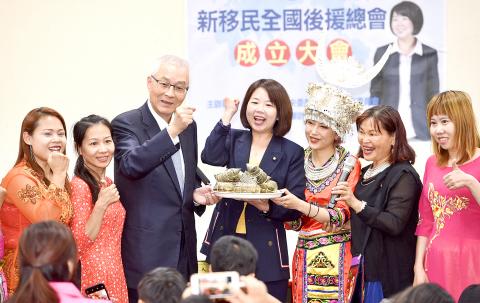Kaohsiung Mayor Han Kuo-yu’s (韓國瑜) policy advisory team yesterday proposed nine policies as part of the Chinese Nationalist Party (KMT) presidential candidate’s platform on new immigrants.
The proposals included lowering the number of years Chinese spouses must wait before they can obtain a national identification card from six to four; establishing a new-immigrant council under the Executive Yuan; building a national-level interpretation system; encouraging cooperation between multinational corporations and students who are children of new immigrants; developing new immigrants’ professional exam-related knowledge; providing an environment for learning Chinese and establishing a digitized learning platform; using the advantage of immigrants’ cultural diversity to nurture international talent; including pregnant new immigrants who are not covered by the national health insurance program in the program; and providing care services to immigrants arriving in Taiwan for the first time.
They proposals were announced by the team at a ceremony at the KMT’s headquarters in Taipei to mark the founding of Han’s national new-immigrant supporters’ club, which was also attended by KMT Chairman Wu Den-yih (吳敦義).

Photo: Peter Lo, Taipei Times
Wu said he hopes that everyone, regardless of their skin color, language or place of birth, can work together can create “one warm, big family.”
Over the past few years, many new foreign spouses have come to Taiwan, said former premier Simon Chang (張善政), the convener of Han’s policy advisory team.
There are now more than 550,000 new immigrants in Taiwan, he said.
There is a Council of Indigenous Peoples for the fewer than 570,000 Aborigines in Taiwan, he said, adding that a similar government agency should be created for new immigrants.
Meanwhile, Han attended the opening of his campaign headquarters in Penghu County.
Next year’s elections, on Jan. 11, “involve the survival or death of the Republic of China,” Han said, calling on voters to decide its future with their votes.
Additional reporting by Liu Yu-ching

Taiwan is stepping up plans to create self-sufficient supply chains for combat drones and increase foreign orders from the US to counter China’s numerical superiority, a defense official said on Saturday. Commenting on condition of anonymity, the official said the nation’s armed forces are in agreement with US Admiral Samuel Paparo’s assessment that Taiwan’s military must be prepared to turn the nation’s waters into a “hellscape” for the Chinese People’s Liberation Army (PLA). Paparo, the commander of the US Indo-Pacific Command, reiterated the concept during a Congressional hearing in Washington on Wednesday. He first coined the term in a security conference last

Prosecutors today declined to say who was questioned regarding alleged forgery on petitions to recall Democratic Progressive Party (DPP) legislators, after Chinese-language media earlier reported that members of the Chinese Nationalist Party (KMT) Youth League were brought in for questioning. The Ministry of Justice Investigation Bureau confirmed that two people had been questioned, but did not disclose any further information about the ongoing investigation. KMT Youth League members Lee Hsiao-liang (李孝亮) and Liu Szu-yin (劉思吟) — who are leading the effort to recall DPP caucus chief executive Rosalia Wu (吳思瑤) and Legislator Wu Pei-yi (吳沛憶) — both posted on Facebook saying: “I

Sung Chien-liang (宋建樑), who led efforts to recall Democratic Progressive Party (DPP) Legislator Lee Kun-cheng (李坤城), was released on bail of NT$80,000 today amid outcry over his decision to wear a Nazi armband to questioning the night before. Sung arrived at the New Taipei District Prosecutors’ Office for questioning in a recall petition forgery case last night wearing a red armband bearing a swastika, carrying a copy of Adolf Hitler’s Mein Kampf and giving a Nazi salute. Sung left the building at 1:15am without the armband and covering the book with his coat. Lee said today that this is a serious

The Ministry of Economic Affairs has fined Taobao NT$1.2 million (US$36,912) for advertisements that exceed its approved business scope, requiring the Chinese e-commerce platform to make corrections in the first half of this year or its license may be revoked. Lawmakers have called for stricter enforcement of Chinese e-commerce platforms and measures to prevent China from laundering its goods through Taiwan in response to US President Donald Trump’s heavy tariffs on China. The Legislative Yuan’s Finance Committee met today to discuss policies to prevent China from dumping goods in Taiwan, inviting government agencies to report. Democratic Progressive Party Legislator Kuo Kuo-wen (郭國文) said